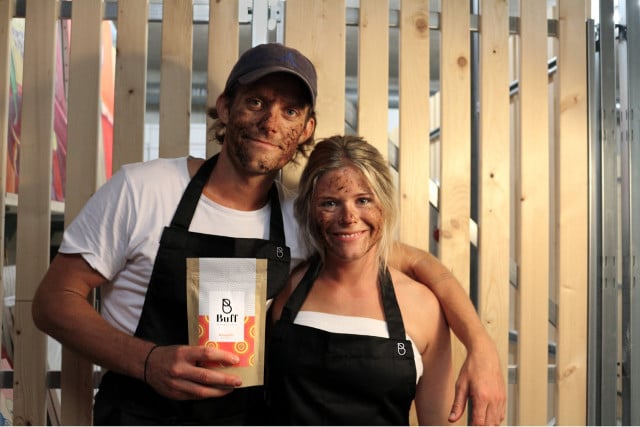BUSINESS
The pros and cons of starting your own business in Switzerland
Thinking of creating a startup? Here’s what it’s like.
Published: 15 March 2017 11:29 CET

Brother and sister team Tom and Amy Derrington. Photo: Tom Derrington
It was an appropriate place to have a eureka moment. Brother and sister Tom and Amy Derrington, British expats living in Bern, were sitting in the Swiss capital’s popular coffee shop Einstein Kaffee when they came up with the idea for their business – to create a body scrub from used coffee grounds.
After turning Amy’s kitchen into a scrub-hub, and a bit of experimenting on family and friends, last September the entrepreneurial pair started BuffScrub, an online mail order business selling their very own scrubs using organic coffee grounds supplied from Einstein’s and another coffee shop, Blaser Kaffee.
Originally from Bournemouth on the south coast of England, Tom and Amy both ended up in Bern for love – Amy met her Swiss husband in London and Tom’s partner also lived in Bern. And it turns out it’s not been a bad place to set up a business. Here, Tom tells The Local what they’ve learned from launching a startup in Switzerland.
CON: The Swiss can be all talk, no action
We’d heard all these horror stories about trying to set up a business in Switzerland, that the Swiss were very good at looking but not at buying. And we have experienced that – we’ve had a lot of interest, lots of people emailing us with questions and visiting the website, but then abandoning checkouts. We called it checkout phobia.
PRO: The Swiss business world is welcoming to expats
We were worried that, as non-Swiss people trying to bring a product out, the Swiss might be a bit closed off, but actually we’ve found the opposite. People have been very welcoming and open to a new idea. In England I worked as a startup advisor for a European project, helping young people try and get their business off the ground. I know from my business there how tough it is to get people to engage; a lot of people in England we found were very closed off. Here we found the opposite, we had newspaper 20 Minuten contacting us, hotels asking if we can come and show them the product. It’s been really encouraging.
PRO: The Swiss startup scene is thriving
When I was first in Switzerland I was under the impression it was a couple of years behind everywhere else in terms of trends. But compared to the startup scene in the UK I would say it seems a lot more thriving here. Maybe there’s a bit more financial security around here and people are more up for taking these risks. There are lots of workspaces and pop-up shops and a really great vibe.
PRO: There’s plenty of help out there
We entered a competition for startups run by the university of Bern and got chosen as a finalist. Through that competition you get access to investors and there’s prize money for the winners, plus you get business coaching and mentoring as well as free legal consultation. It’s been invaluable for us.
Generally speaking, we found a lot of good information online, through English Forum, business sites and on the websites of several other companies who offer business foundation services. I think Switzerland has a fairly welcoming approach to self-employment for foreigners and I would say that once you get over the initial warnings and rules, it is not as complicated as it seems.
CON: People can be cautious
I think there’s a lot of caution when it comes to setting up businesses here – make sure your business plan is perfect, make sure the numbers figure out and don’t do anything until all that is set. We perhaps went at it a bit too gung-ho – we just started making the product, getting it out there, generating a conversation. In England all the advice was: don’t sit around talking about it, just get going on it. I think the advice here was the opposite to that.
PRO: The admin isn't as complicated as you might expect.
That was another surprise: we were sure there would be so much red tape, but actually it’s the opposite. We registered as a sole proprietor – or general partnership – which is much more straightforward than a limited company (GmBH). This just requires some paperwork, the correct visas, an address and a business name which contains one of the partner’s surnames. As non-native German speakers, we did find the legal terms and paperwork quite complicated so we opted to use a company that specializes in registering businesses. This was a simple online process and made everything so much easier. We were definitely prepared to pay a bit extra in order to save us time and stress.
CON: Postage charges are high
Figuring out how to mail the scrubs out was quite difficult because they have set prices here and it’s quite pricey. We had to find something that was just right to fit into the ‘letter’ size. That was a trial and error process that we got over (though it still depends a bit on who we get at the counter!). That would have been a major off-putting thing for an online business.
PRO: English isn’t a barrier
Neither of us speak very good German. We are both studying, it’s getting there. But it’s been so much easier than we thought to use English for our business meetings. Quite a few times when we’ve had meetings lined up we’ve asked them if we should bring along a German speaker. But every time they’ve said ‘no, it’s nice to converse in English for a change!’
CON: Setting up in a quadrilingual country presents a challenge
Originally we thought we’d go with English as the business language, and the feedback from that was quite good. But we were conscious that we might be losing part of the market, so we got a friend of ours who has lived all over Switzerland to translate our labels into Swiss German and we’ve had really good feedback from that. People say they much prefer that to High German. We’ve been concentrating on Zurich and Bern for the moment but as we start to branch out into other areas of Switzerland it will be a new challenge to think about whether we go for French and Italian too.
Have you started an unusual business in Switzerland? Let us know your experience at [email protected]
Url copied to clipboard!


 Please whitelist us to continue reading.
Please whitelist us to continue reading.